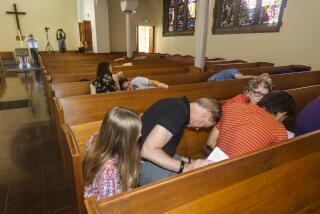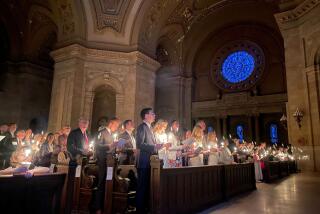How do you connect with your faith under coronavirus self-quarantine? Take it online
- Share via
On Sunday morning, Kerry Morrison shut the door of her home office, settled in at her desk and flipped open her laptop. It was prayer time in the age of the coronavirus.
Her nondenominational Christian church, Ecclesia Hollywood, has moved gatherings online amid calls for social distancing to slow the spread of the pandemic. As she sipped coffee and knitted a new scarf from the comfort of her Windsor Square home, her pastor welcomed the virtual faithful from the other side of the screen.
“For the first time maybe in modern history, the world is united in our shared experience of pain,” Pastor Jon Ritner told his live-stream congregation of around 160 households. “But in the midst of all of that, I really believe the entire world is also united in a shared prayer.”
As state and local officials ramp up restrictions on Californians’ movements, many houses of worship are moving their services, classes and prayer groups online.
Ecclesia announced its decision to broadcast Sunday gatherings earlier this month. The shift to digital worship has touched multiple faith communities, forcing mosques, churches, synagogues and Buddhist temples, among others, to roll out contingency plans.
“We’re trying to be flexible and adaptable and we’ll stay in constant communication through the Ecclesia Facebook page,” Ritner said in a Facebook video. “We also hope that that page becomes a place where our community can come together.”
Morrison’s fellow congregants did their best to re-create the familiar, comforting rituals of their regular gatherings. Several wrote about the makeshift elements they’d scrounged from the cupboard when it came time for Communion: banana bread and month-old Prosecco, an English muffin and coconut milk, or a saltine cracker and lemonade in place of a Communion wafer and wine.
“It seemed like one of the most intimate worship experiences I have been involved in,” Morrison, 64, said. “We all sense that we are going through something that is globally profound.”
The shift comes at a time when multiple faiths would be preparing for key holidays — Easter, Ramadan and Passover all will be celebrated in April. President Trump said Tuesday that he wanted the nation to be “opened up and just raring to go” by mid-April, despite health experts’ warnings that that timetable was premature.
“I would love to aim it right at Easter Sunday, so we’re open for church service and services generally on Easter Sunday,” he said in a Fox News interview.
Before the president’s comments, faith leaders already were making plans to hold holidays at a safe distance.
Last week, the Archdiocese of Los Angeles announced the suspension of public Mass until at least March 29. Roman Catholics in the Southland have been encouraged to pray at home while the archdiocese provides a livestream of non-public Masses from the Cathedral of Our Lady of the Angels. But that presents its own challenges.
“What we’re finding is we’re starting to miss the physicality. There is something really beautiful about being in the presence of other people,” said Kathleen Domingo, the archdiocese’s senior director of the office of life, justice and peace.
Still, she said, many faithful are joining the streams and using them as a lifeline during what can be an otherwise lonely and isolating time.
“It is helpful to connect this way, even though it’s always going to be second-best,” she said.
Aside from online services, the diocese continues to send priests to pray for and anoint those who are nearing the end of their lives, Domingo added.
“They are some of the only people allowed into hospital settings right now,” she said. “I appreciate our medical and civic leaders recognizing the importance of that.”
At the Orange County Islamic Foundation, congregants first began social distancing by praying six feet apart. When warnings from officials grew more dire, the mosque suspended its in-person prayers entirely.
“It was hard because we love our worship, but not impossible,” said Imam Tarik Ata.
Now, he said, people pray at home. But when it comes time for reflection or spiritual talks, they too have moved to social media such as Facebook and YouTube.
In lieu of online Friday prayers — which Ata said the mosque won’t host because the ritual requires a certain number of worshipers to be physically present — he plans on streaming an evening spiritual reflection. That way, he said, he can continue to engage with the community.
“People are saying they feel spiritually stronger now. We were worried it would be the opposite,” he said. “I think people, when they feel a sense of hardship, it is natural to seek a higher power. Not just our faith, but everyone.”
Rabbi Sharon Brous has suspended all in-person gatherings at Ikar — which means “the gist” or “the essence” in Hebrew — in accordance with experts’ recommendations.
Just before Shabbat one evening earlier this month, the rabbi spoke to her flock in a Facebook live video. For 16 years, she told them, they had come together as a community to celebrate Shabbat and find comfort and strength in the Jewish tradition. Now, she said, many communities are shuttering because they have been warned it was not safe.
So, instead of gathering face-to-face that night, she shared words from the Torah in front of her computer’s camera. Brous summarized an article she’d read about the Alaskan earthquake of 1964, a 9.2 magnitude temblor that had whipped the city of Anchorage, triggering landslides that damaged much of the downtown area.
Researchers, she said, thought that they would come across the worst of humanity when they arrived. Instead, they found connectedness in the aftermath of a catastrophe.
She told her virtual audience that she hoped they could be like the Alaskans who found “resilience and levelheadedness and kindness and cooperation precisely in their moment of greatest vulnerability.”
Viewers left comments as she spoke.
“Shabbat Shalom, everyone,” one wrote. “Thank you so much for doing this.”
In addition to providing more online resources for prayer and learning, Brous said Ikar also has created a list of 330 people in the community who are particularly vulnerable due to age, health problems, job instability or because they suffered a recent trauma that would make the current climate especially challenging.
“There’s a buddy system,” Brous said. “Everybody in the community should be in touch with someone else in the community.”
When Ikar sent an announcement that the congregation would no longer be meeting in person, people wrote back in distress, she said.
“They said they collapsed to the ground in tears, knowing they wouldn’t be able to meet, even though they knew it was the right thing,” she recalled. “It was devastating to them. The ability to go to your church or synagogue or mosque in a hard time is really important to people.”
The move to social media can alienate those who do not have easy access to the internet, she said, and older congregants who aren’t familiar with technology could easily be left behind.
“One thing we are trying to do is address the digital divide as much as we can,” she said. “We’re doing Zoom training for boomers and those who are older in the community.”
Another challenge? As a Jewish community, Brous said, “we don’t use technology on Shabbat on Friday until three stars come out on Saturday night.” That’s why her recent Facebook post took place before the sun went down.
Community members, she said, have been grateful for Ikar’s flexibility.
“I heard from one person who was divorced and lived alone and struggled with anxiety and depression and suicidality,” Brous said. “She said she was concerned for her mental health.”
The pair talked through what it meant to be a community, and how members could still find comfort in one another without being in the same room.
A few Facebook and Zoom gatherings later, Brous said, the woman felt safely held by her congregation.
More to Read
Sign up for Essential California
The most important California stories and recommendations in your inbox every morning.
You may occasionally receive promotional content from the Los Angeles Times.














